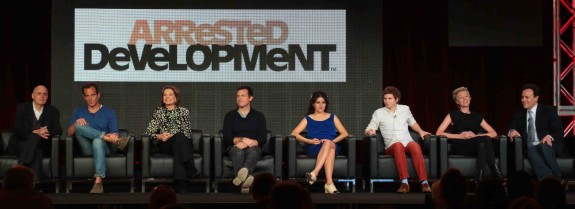 Seven years after it went off the air, after three critically-acclaimed but relatively low-rated seasons, cult favorite “Arrested Development” will be back in May.
Seven years after it went off the air, after three critically-acclaimed but relatively low-rated seasons, cult favorite “Arrested Development” will be back in May.Because all of the episodes will be available at once on Netflix, Jason Bateman says, “ you can watch a portion of, say, Michael’s episode and then click over into Lucille’s episode and perhapsThe post-TV life of “Arrested Development” was first going to be a film — and those plans are still on, Bateman says.
The Netflix work will “simply just the first act of what we hope to continue and complete in a movie, which would be act two and act three,” Bateman says.
“And eventually a theme park,” Will Arnett says.
All that means that the 14 pieces don’t really constitute a fourth season of “Arrested Development.” And while it will have enough dramatic shape to stand alone, it will also be a gateway to the possible movie.
Issuing all the episodes at once may be an unusual way to present them, but is fitting in an era when increasing amount of viewers — especially at Netflix — binge on watching a lot of episodes at once of a chosen series, he said.
Steven Van Zandt had the same hesitation when Netflix executives asked him to release his “Lillehammer” series all at once. But then they told him it was like issuing an album worth of songs.
“Steven thought about it and said, ‘Okay. Yeah, let’s do it,’” Hurwitz says.
It’s a way some of the cast members have started consuming TV as well.
“I actually spent the entire summer watching ‘Breaking Bad,’ from the first episode to the last episode and I loved it,” Portia De Rossi says. “It was a really new experience. I’d never done that before. But I loved having the control of how I wanted to watch it, how many I wanted to watch in a row. And that is different to what we’re doing, a little bit different. But I like it. People kind of are used to getting what they want now, you know. And it was great not to have to wait a week to see an episode of something that we’re really into and want to keep watching.”
Michael Cera, no longer the kid George Michael, got into the writers’ room to contribute to some episode, Hurwitz says. “He completely understood this complex story. He added to it. He pitched in character. It became clear — it’s like, wow, this is like his first langauge, ‘Arrested Development.’”
When it came to gathering and shooting, some of the cast didn’t ever see one another as they put in their time. But on occasions when they were all gathered together, Jessica Walter says, “It was surreal. Because there we all were nine years later, except for the two kiddies who grew. We all were like the same. The same voices came out. The set was recreated, the penthouse down to the nails in the wall. It was really surreal.”
The cast and creator were reluctant to reveal even the smallest details about what happens in the new episodes to retain surprise for the fans.
But Walter says, “as far as Lucille goes, I have finally gotten to play Joan Crawford with laughs.”
They wouldn’t even show a clip from the upcoming season, but they did show an outtake — a hilarious bit in which Tony Hale’s Buster agrees to be a conduit between Walter’s Lucille, smoking in a room where it is not allowed, taking her smoke shotgun-style from her mouth and exhaling it out the door – over and over and over.